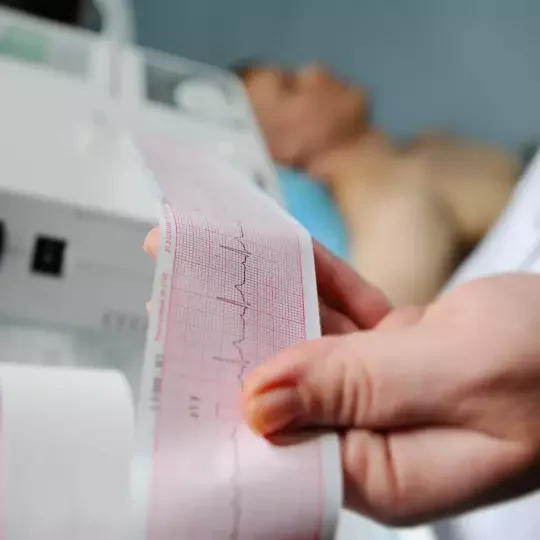CARDIAC ARRHYTHMIA TREATMENT IN LONDON
What is cardiac arrhythmia?
A cardiac arrhythmia is when your heart beats with an irregular or abnormal rhythm. This happens because of changes in your heart’s electrical system, which normally controls the way the heart beats in a steady pattern.
Instead of a regular rhythm, an arrhythmia can cause the heart to beat too fast, too slow or irregularly. These rhythm changes can reduce the heart’s ability to pump blood effectively around the body.
When the heart’s rhythm is disrupted, you may feel dizzy, faint or notice palpitations. Without treatment, some arrhythmias may lead to more serious problems, such as stroke or heart failure.
At Expert Cardiologist, our specialists are experienced in diagnosing and treating cardiac arrhythmias. We use advanced heart tests to identify the cause and create a personalised treatment plan to restore your heart’s rhythm and protect your long-term health.

Cardiac arrhythmia treatment
The best treatment for a cardiac arrhythmia depends on the type and how severe it is. We provide a full range of treatment options, starting with lifestyle changes and progressing to procedures where needed.
Types Of cardiac arrhythmias
There are several different types of cardiac arrhythmia, each affecting the heart’s rhythm differently. The most common include:
Symptoms of cardiac arrhythmia
Cardiac arrhythmias can cause a wide range of symptoms depending on the type and severity of the irregular heartbeat. For some people, the signs may be mild, while for others they can be more disruptive.
Common symptoms of cardiac arrhythmia include:
- Heart palpitations (a fluttering, pounding or racing sensation in your chest)
- Shortness of breath
- Dizziness or lightheadedness
- Chest pain or discomfort
- Fainting
- Fatigue
- Sweating during rapid heartbeats
- Weakness
- A fluttering feeling in the chest
It’s important to know that not everyone with a cardiac arrhythmia will have obvious symptoms. In some cases, an arrhythmia may only be detected during a routine heart check-up or test, such as an electrocardiogram (ECG). This is why regular heart checks are so valuable, as they can identify an arrhythmia early and reduce the risk of complications.

What causes cardiac arrhythmias?
Cardiac arrhythmias can develop for many reasons. Underlying heart conditions, such as coronary artery disease or cardiomyopathy, may disrupt the heart’s electrical system. Lifestyle factors and other health conditions also play a part.
Some of the main risk factors for cardiac arrhythmias include:
- Older age
- Family history of arrhythmias
- High blood pressure (hypertension)
- Diabetes
- Obesity
- Smoking
- Excessive alcohol consumption
- Too much caffeine or other stimulants
- High levels of stress or anxiety
- Low levels of physical activity
Diagnosing cardiac arrhythmias
Diagnosing cardiac arrhythmia usually involves a series of simple heart tests. The most common is an electrocardiogram (ECG), which records the heart’s electrical activity and rhythm. An ECG can quickly detect irregularities such as atrial fibrillation or ventricular tachycardia.
In some cases, we may recommend wearing a portable ECG monitor, such as a Holter monitor, which tracks your heart’s rhythm over 24 hours or several days. These devices can identify arrhythmias that might not appear during a shorter ECG.
An echocardiogram may also be used to create images of the heart’s structure and how it pumps using ultrasound, while a stress test monitors the heartbeat during exercise.
Together, these tests help identify the type of arrhythmia and its underlying cause so your cardiologist can recommend the most effective treatment plan for your needs.

Worried about your heart?
DON’T suffer in silence, seek expert help without delay
Book a cardiology appointment with Dr Karagiannis
Cardiac arrhythmias can be difficult to detect without specialist tests, and early treatment is key to protecting your heart health. At Expert Cardiologist, we provide comprehensive diagnostic testing and a full range of treatments tailored to your individual needs.
Whether your arrhythmia is best managed with lifestyle changes, medication, or a procedure such as catheter ablation, Dr Georgios Karagiannis will guide you through every step with expert care and support.
Book your consultation today to access prompt cardiac arrhythmia treatment and reassurance from a leading London cardiologist.
GET IN TOUCH
Request A Call Back
Please fill in the contact form and we will call you back at a time most convenient for you.



